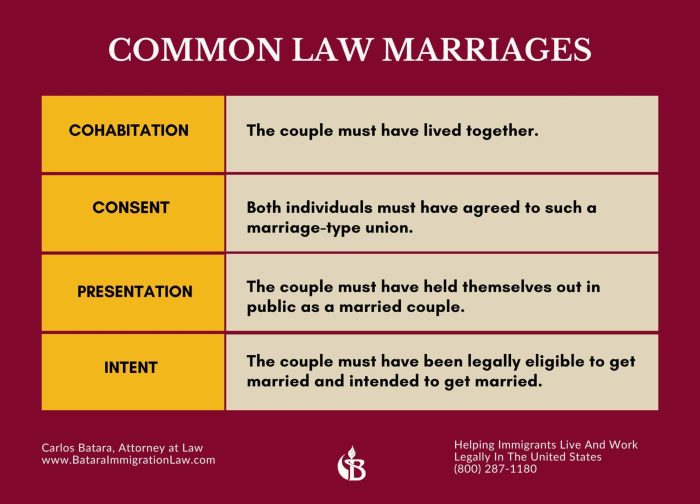
Does Florida have common law marriage? This question often arises for couples who have been together for a long time without the formality of a traditional wedding. Florida, unlike some other states, does not recognize common law marriage. This means that even if a couple lives together, presents themselves as married, and intends to be married, they are not legally considered married in the eyes of the state.
While the concept of common law marriage may seem appealing for its simplicity, Florida’s stance on the matter is clear. It’s important to understand the legal implications of this decision, as it can affect various aspects of a couple’s relationship, including property rights, inheritance, and child custody.
Introduction to Common Law Marriage
Common law marriage, also known as informal marriage or unregistered marriage, is a legal relationship in which a couple is recognized as married without a formal marriage ceremony or license. This legal recognition is based on the couple’s presentation of themselves as married to the public, their intent to be married, and their cohabitation as husband and wife.
The concept of common law marriage originated in England during the Middle Ages when formal marriage ceremonies were not always readily available. It was a way for couples to be recognized as married without the need for a religious ceremony or official documentation. This practice was later adopted in many American colonies, where it was seen as a practical way for couples to establish their legal rights and obligations.
States That Recognize Common Law Marriage
While common law marriage was once widely recognized in the United States, it has become increasingly uncommon in recent years. Currently, only a handful of states still recognize common law marriage. These states include:
- Colorado
- Iowa
- Kansas
- Montana
- New Hampshire (for inheritance purposes only)
- Oklahoma
- Rhode Island
- South Carolina
- Texas
- Utah
- District of Columbia
It’s important to note that even in states where common law marriage is recognized, there are specific requirements that must be met for a couple to be considered legally married. These requirements can vary from state to state.
Florida’s Position on Common Law Marriage

Florida does not recognize common law marriage. This means that couples who live together and present themselves as married, even if they believe they are legally married, will not be recognized as such under Florida law.
Florida’s Non-Recognition of Common Law Marriage
Florida is one of a few states that do not recognize common law marriage. This decision is based on the state’s desire to prevent fraudulent claims of marriage and to ensure that marriage is a formal and legally binding contract.
Comparison with Other States
The recognition of common law marriage varies widely across the United States. States that recognize common law marriage generally require couples to meet specific criteria, such as holding themselves out as married to the public, intending to be married, and living together as husband and wife. While Florida does not recognize common law marriage, several neighboring states do, including:
- Alabama
- Colorado
- Iowa
- Kansas
- Montana
- New Hampshire (for inheritance purposes only)
- Oklahoma
- Rhode Island
- South Carolina
- Texas
- Utah
- District of Columbia
It is important to note that even in states that recognize common law marriage, the requirements and procedures for establishing such a relationship can vary.
Requirements for Establishing Common Law Marriage in Florida

Florida does not recognize common law marriages. This means that couples cannot establish a legally binding marriage relationship simply by living together, presenting themselves as married, or intending to be married. Even if a couple believes they are in a common law marriage, Florida courts will not recognize it as a valid marriage.
Holding Oneself Out to the Public
While Florida does not recognize common law marriages, the concept of “holding oneself out to the public” is relevant in other legal contexts, such as inheritance cases. This concept refers to the public perception of a couple’s relationship. If a couple presents themselves to the public as married, it can be considered evidence of a marital relationship, even if a legal marriage does not exist.
For example, if a couple shares a last name, files joint tax returns, or refers to each other as “husband” and “wife” in public, this could be seen as evidence that they are holding themselves out to the public as married. However, this evidence alone is not sufficient to establish a common law marriage in Florida.
Legal Consequences of a Common Law Marriage in Florida
In Florida, a common law marriage, if legally recognized, carries the same legal weight as a traditional marriage. This means that couples who meet the requirements for establishing a common law marriage enjoy the same rights and obligations as those who are formally married. This section will delve into the legal implications of a common law marriage in Florida, focusing on areas such as property division, inheritance, and child custody.
Property Division in Common Law Marriages
When a common law marriage ends, either through separation or death, the division of assets acquired during the relationship becomes a significant issue. Florida law applies the principle of “equitable distribution” to divide marital property, meaning that assets are divided fairly, but not necessarily equally.
- Marital Property: Property acquired during the marriage, including real estate, bank accounts, vehicles, and investments, is considered marital property and is subject to division. This includes assets acquired through the joint efforts of both partners, even if they are registered in one person’s name.
- Separate Property: Property owned before the marriage, or received as a gift or inheritance during the marriage, is considered separate property and is generally not subject to division. However, separate property can be commingled with marital property, making it difficult to distinguish in some cases.
- Tracing: In cases where separate property has been commingled with marital property, the courts may require the parties to “trace” the source of the funds or assets to determine which portion is marital and which is separate. This can be a complex process involving financial records and expert testimony.
Inheritance Rights in Common Law Marriages
Common law spouses in Florida have certain inheritance rights, which are similar to those of formally married couples.
- Intestacy: If a common law spouse dies without a will, Florida law dictates how their assets will be distributed. The surviving spouse will typically inherit a significant portion of the deceased spouse’s estate, depending on the presence of children or other heirs.
- Wills: A common law spouse can be named as a beneficiary in a will, ensuring they receive a specific portion of the deceased spouse’s assets. It’s crucial for common law couples to create and update wills to reflect their wishes regarding property distribution.
- Estate Planning: Consulting with an estate planning attorney is recommended to ensure that the rights and wishes of both partners are protected in the event of death. This may involve creating a will, a trust, or other estate planning documents to specify how assets will be distributed.
Child Custody in Common Law Marriages, Does florida have common law marriage
When children are involved in a common law marriage, the legal framework for custody and support is similar to that of formally married couples.
- Parental Rights and Responsibilities: Both parents, regardless of their marital status, have the right and responsibility to provide for their children’s well-being. This includes financial support, physical custody, and decision-making regarding education, healthcare, and religious upbringing.
- Custody Orders: If the parents cannot agree on custody arrangements, the court will determine the best interests of the child. Factors considered include the child’s age, health, and relationship with each parent, as well as the stability of each parent’s home environment.
- Child Support: Both parents are generally obligated to contribute financially to the child’s support, with the amount determined based on factors like income, the child’s needs, and the time each parent spends with the child.
Legal Disputes Arising from Common Law Marriages
Common law marriages, while recognized in Florida, can lead to various legal disputes, particularly when the relationship ends.
- Establishing the Existence of the Marriage: One of the most common disputes involves proving the existence of a common law marriage. This often requires presenting evidence to demonstrate that the couple held themselves out to the public as married and intended to be married.
- Property Division: Disputes over the division of marital property can arise, especially when there is disagreement about the nature and value of assets or when separate property has been commingled.
- Inheritance: Conflicts can arise over inheritance rights, especially if the deceased spouse did not leave a will or if the will does not clearly address the common law spouse’s inheritance.
- Child Custody and Support: Disputes regarding custody and support arrangements can arise, particularly when the parents disagree on the best interests of the child or on the amount of child support.
Conclusive Thoughts

Navigating the legal landscape of relationships can be complex, especially when it comes to the intricacies of marriage. While Florida does not recognize common law marriage, it’s essential to understand the implications of this stance on your rights and responsibilities. If you are considering a long-term relationship, seeking legal advice can help you make informed decisions and protect your interests. Remember, understanding the legal framework surrounding your relationship can provide clarity and peace of mind.
FAQ Resource: Does Florida Have Common Law Marriage
What are the benefits of getting legally married in Florida?
Legal marriage in Florida provides numerous benefits, including legal recognition of your relationship, rights to property and assets, inheritance rights, and access to spousal benefits like health insurance.
Can I establish a common law marriage in another state and have it recognized in Florida?
No, Florida does not recognize common law marriages established in other states. If a couple enters into a common law marriage in a state that recognizes it, that marriage may be valid in that state, but not in Florida.
If I’m not legally married, how can I protect my rights and assets in a relationship?
You can consider creating a cohabitation agreement or a prenuptial agreement to Artikel your rights and responsibilities regarding property, finances, and other aspects of your relationship.




